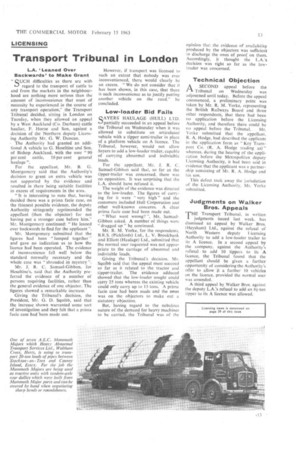Transport Tribunal in London
Page 15

If you've noticed an error in this article please click here to report it so we can fix it.
L.A. 'Leaned Over Backwards' to Make Grant
" QUCH difficulties as there are with ■ --) regard to the transport of cattle to and from the markets in the neighbourhood are nothing more serious than the amount of inconvenience that must of necessity be experienced in the course of any transport operation," the Transport Tribunal decided, sitting in London on Tuesday, when they allowed an appeal by a West Auckland (Co. Durham) cattle haulier, F. Home and Son, against a decision of the Northern deputy Licensing Authority Mr. G. W. Duncan.
• The Authority had granted an additional A vehicle to G. Heseltine and Son, of Bishop Auckland, with the user "90 per cent cattle, 10 per cent general haulage ".
For the appellant, Mr. B. G. Montgomery said that the Authority's decision to grant an extra vehicle was not supported by the evidence and resulted in there being suitable facilities in excess of requirements in the area.
"It is interesting to note that, having decided there was a prima facie case, on the thinnest possible evidence, the deputy Authority stringently reprimanded the appellant (then the objector) for not having put a stronger case before him.Mr. Montgomery continued: "He leaned over backwards to find for the applicant ".
Mr. Montgomery submitted that the figures had been "lumped together' and gave no indication as to how the licence had been operated. The evidence of inconvenience fell well below the standard normally necessary and the whole case was shrouded in mystery ".
Mr. J. R. C. Samuel-Gibbon, for Heseltine's, said that the Authority preferred the evidence of a number of persons requiring facilities, rather than the general evidence of one objector. The figures showed a remarkable increase.
Giving the Tribunal's decision, the President, Mr. G. D, Squibb, said that the increase shown warranted some sort of investigation and they felt that a prima facie case had 'been made out. However, if transport was licensed to such an extent that nobody was ever inconvenienced, there would clearly be an excess. We do not consider that it has been shown, in this case, that there is such inconvenience as to justify putting another vehicle on the road," he concluded.
Low-loader Bid Fails CAYERS HAULAGE (HULL) LTD. P—Ipartially succeeded in an appeal before the Tribunal on Wednesday when it was allowed to substitute an articulated vehicle with a tipper semi-trailer in place of a platform vehicle on A licence. The Tribunal, however, would not allow Sayers to add a low-loader trailer, capable of carrying abnormal and indivisible loads.
For the appellant, Mr. J. R. C. Samuel-Gibbon said that, so far as the tipper-trailer was concerned, there was no opposition. It was surprising that the LA. should have refused it.
The weight of the evidence was directed to the low-loader. The figures of carrying for it were "very high" and the customers included Hull Corporation and other well-known concerns. A clear prima facie case had been made out.
"What went wrong? ", Mr. SamuelGibbon asked. A number of things were dragged up" he continued.
Mr. R. M. Yorke, for the respondents. B.R.S. (Pickfords) Ltd., L. V. Brookbank and Elliott (Haulage) Ltd., submitted that the normal user requested was not appropriate to the carriage of abnormal and indivisible loads.
Giving the Tribunal's decision, Mr. Squibb said that the appeal must succeed so far as it related to the tractor and tipper-trailer. The evidence adduced showed that the low-loader sought could carry 25 tons whereas the existing vehicle could only carry up to 13 tons. A prima facie case had been made and the onus was on the objectors to make out a statutory objection.
But, having regard to the nebulous nature of the demand for heavy machines to be carried, the Tribunal was of the opinion that the evidence of availability produced by the objectors was sufficient to discharge the onus of proof on them. Accordingly, it thought the L.A.'s decision was right so far as the lowloader was concerned.
Technical Objection ASECOND appeal before the Tribunal on WedneSdaY was adjourned until today. Before the appeal commenced, a preliminary point was taken by Mr. R. M. Yorke, representing the British Railways Board and three other respondents, that there had been no application before the Licensing Authority, and therefore there could be
no appeal before the Tribunal. Mr. Yorke submitted that the appellant, R. A. Hodge, had described the applicant in the application form as Key Transport Co. (R. A. Hodge trading as)" whereas, during the hearing of the application before the Metropolitan deputy Licensing Authority, it had been said in evidence that the applicant was a partnership consisting of Mr. R. A. Hodge and his son.
This defect took away the jurisdiction of the Licensing Authority, Mr. Yorke submitted.
Judgments on Walker Bros. Appeals THE Transport Tribunal, in written I judgments issued last week, has dismissed an appeal by Walker Bros. tHeysham) Ltd., against the refusal of North Western deputy licensing Authority to add a low-loader trailer to its A licence. In a second appeal by the company, against the Authority's refusal to add 10 tippers to its A licence, the Tribunal found that the appellant should be given a further opportunity of considering the Authority's offer to allow it a further 10 vehicles on the licence, provided the normal user was amended.
A third appeal by Walker Bros. against the deputy L.A.% refusal to add an 84-ton tipper to its A licence was'allowed.












































































































